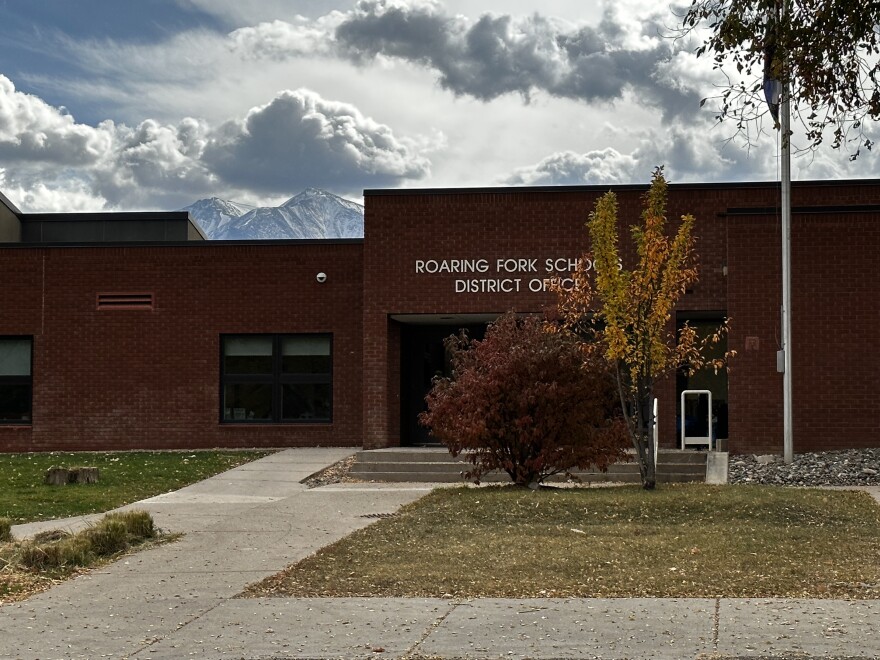The student attendance rate in the Roaring Fork School District (RFSD) has steadily improved over the last three years.
In the 2023-2024 school year, attendance was at 92%, a rate calculated by dividing the number of days attended by the total number of school days for each student.
RFSD staff set an ambitious goal to reach 95% attendance last year. While they failed to meet that expectation, district staff told the Board of Education on Wednesday that they’re continuing to push for higher attendance across elementary, middle, and high schools.
Chief Academic Officer Stacey Park said attendance matters because if students aren’t there, they aren’t able to participate in learning.
“For safety too, for schools and families, we need to know where their child is and that they’re accounted for during the school day,” Park said. “So if parents are aware of the absence, the school needs to know why, for a number of reasons including tracking illness and state reporting.”
When communicating with families about attendance, Park said the district’s approach is twofold.
“Generally our practice is to recognize positive attendance and celebrate it, and when a student is absent we lead with curiosity to find out more,” Park said. “And offer support and determine how the student will access learning.”
The number of chronically absent students in the district went down in the last school year, from 33.9% to 26.8%, which includes all students who miss at least 17 days of school, or roughly one academic unit. More than one quarter of the student body is still missing three and a half weeks of school every year.
More students were truant in the 2023-2024 school year, which means students with four unexcused absences in one month, or more than 10 in a year. At 4.1% of the student population, that’s more than the state average of 3.4%.
Park told the school board that attendance will continue to be a priority for the upcoming school year.
Equity audit progress
The Roaring Fork School District is finalizing a contract to complete an equity audit by the end of 2024.
Promise54, a nonprofit based in Chicago, will help RFSD evaluate staff diversity, resource allocation, and other policies and regulations to determine where its work can serve students more equitably.
School board members adopted a Diversity, Equity, Inclusion, and Anti-racism policy in the spring, which requires the district to conduct an independent review of its policies.
In a presentation to the school board on Wednesday, Superintendent Dr. Anna Cole said district staff chose Promise54 in part because of its ability to help districts recruit and retain teachers with diverse backgrounds.
“Because of the needs that we’ve really identified in our strategic plan, (and) a lot that we’ve heard from stakeholders about the importance of recruiting and retaining a staff that reflects the diversity of our students, this felt like a really great match,” Dr. Cole said.
Work will begin in about two weeks, and Dr. Cole said they’re on track to complete the audit by the end of 2024.
Based on the results, the school board will discuss how to fund efforts to make RFSD a more equitable school district in its 2025-2026 budget discussions.
Dr. Cole told school board members that Promise54 will not study the school district’s programming to support emerging bilingual students. After conversations with various consulting firms, district staff decided to study this metric separately through a Culturally and Linguistically Diverse Program Review, which it will consider funding in the spring.
Student fee changes
The Roaring Fork School District wants to move away from issuing student fees as it implements a new structure for how schools charge students for materials.
Elementary and middle schools can only charge $90 to cover supplies in classes required for graduation. High schools can charge $180. That does not include charges for elective courses not required for graduation, courses sponsored by community partners like CMC, or students who want upgraded materials.
Eligible families can have the fees waived, but Dr. Cole wants to avoid charging for student fees altogether.
“We can, as a district, allocate funding to our schools that ensures that kids in every classroom have the materials that they need, and our schools have appropriate discretionary budgets to do the activities and field trips that fit their program model,” Dr. Cole said in Wednesday’s school board meeting. “In a lot of ways our schools have used fees to do this, and we would like to move back.”
Dr. Cole said the rollout of this year’s policy changes was uneven in their high schools, and blamed the issue on poor communication with schools from the district.
She added that staff turnover further complicated the implementation.



